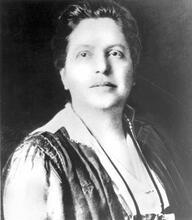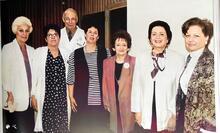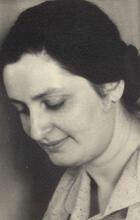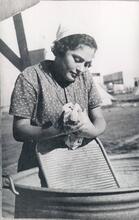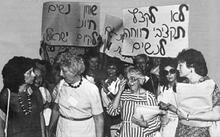Ronit Elkabetz
Despite the fact that she never studied acting, Ronit Elkabetz became one of Israeli cinema's leading actors. Born to recent immigrants from Morocco, she grew up in Kiryat Yam, in the northern periphery. She played in some of the major Israeli films of the late twentieth and early twenty-first centuries, including Sh'chur (Azoulay-Hasfari, 1994), Late Marriage (Kosashvili, 2001), Or, My Treasure (Yedaya. 2005), and The Band's Visit (Kolirin, 2006). She is particularly remembered for the trilogy she directed with her brother Shlomi Elkabetz: To Take a Wife (2004), The Seven Days (2009), and Gett: The Trial of Viviane Amsalem (2013), all addressing the issue of the oppression of Mizrahi women in the name of the Jewish religion.
For two and a half decades, Ronit Elkabetz was the first lady of Israeli cinema. She seemed to burst into the industry out of nowhere—more precisely from Israel's peripheral northern city of Kiryat Yam. At the time, no one would have predicted she would become the most important Israeli actress and bring about a dramatic change to the always burning issue of ethnic representation in Israeli cinema.
Family and Early Life
Ronit Elkabetz was born on November 27, 1964, in Beer Sheva to a modest Jewish Moroccan family. Her family emigrated to Israel from the city of Essaouira, Morocco, in 1962. Ten years later, the family left the southern city and moved to Kiryat Yam, a suburb of Haifa. Her mother worked as a hairdresser and her father worked at the local post office, as reflected in her first feature To Take a Wife. She is the eldest of her parents' four children, with three younger brothers. The youngest Shlomi, became her co-director in the production of her trilogy (and later a director in his own right with his monumental documentary The Black Notebooks, 2021. Nothing in her childhood predicted she would become an actress, and yet, despite the fact that she never studied acting, she became one of the most popular Israeli actresses. In her mid-forties, she married architect Avner Yashar and gave birth to twins, Omri and Shalimar.
Entering the World of Cinema
Elkabetz entered the world of cinema as if by accident, when, working as a model, she was invited to join the cast of Israeli director Daniel Waxman's The Appointed (HaMeyuad, 1990). Her beauty differed from that of other Israeli actresses of the time. Lit. "Eastern." Jew from Arab or Muslim country.Mizrahi women had before this point generally been viewed according to a shallow stereotype, as generally vulgar and uneducated. Elkabetz brought a new quality to this typecast: mysterious, elusive, “exotic,” and at the same time sophisticated. Above all, she possessed extraordinary acting capabilities, which she demonstrated throughout her short career, starring in leading roles in both Israeli and French films and receiving numerous international awards.
Elkabetz's first major role was in one of the most important Israeli feature films of the 1990s, Hana Azoulay-Asfari's Sh'Chur (1994), an epic set against the background of the massive immigration of Moroccan Jews between 1961 and 1967 and their relocation to deserted development towns in southern Israel. Elkabetz played the role of the protagonist's mentally challenged sister and received her first cinematic awards for her exceptional acting.
Elkabetz’s part in Sh’Chur marked the beginning of a meteoric ascension. In 1997 she moved to Paris and began a new film and theatrical acting career there, not entirely connected to her Jewish identity. She studied French, made her way into the famous Ariane Mnouchkine's Theatre du Soleil, and played in French feature films.
Four years later, following the offer of Dover Kosashvili, a promising young Israeli filmmaker of Georgian origin, Elkabetz returned to Israel to star in Late Marriage (Hatuna Meuheret, 2001). Like Sh'Chur, this film dealt with displaced immigrants—in this case, members of a Georgian community—trying to adapt to their new country. The main character Zaza (played by Lior Ashkenazi) tries to find his own way in Israel, but his conservative immigrant family expects him to marry a girl from the Georgian community. He meets Dina (played by Elkabetz), a single mother of Moroccan origin, and falls in love with her. When Zaza's parents try to change his mind, the fear of losing his ties to his community prompts him to separate from his beloved and live a more traditional life—precisely the life from which he attempted to escape. Late Marriage was an enormous success in Israel and abroad and Elkabetz received superlative reviews for her acting and won ten Ophir awards.
From here the way to Elkabetz's next internationally recognized film was short: the young director Keren Yedaya casted her for Yedaya's first feature film Or, My Treasure (Or, 2004). As opposed to Kosashvili's tragi-comedy, Or was a melodrama about Ruthie, a Tel-Avivian mother who earns her living as a prostitute. The eponymous Or is Ruthie’s only daughter, who would try anything possible to extract her mother from her dreadful situation. But Ruthie is addicted to her life of drugs and prostitution, and all of Or’s attempts fail. Or struggles to earn money from small jobs, such as washing dishes in a restaurant or cleaning their building staircase, but she fails to earn enough to live on. Facing despair, she gives up and enters her mother's world, that of prostitution. In this feminist film, Elkabetz proved to Israel and the world that she was a consummate actor, giving herself entirely to the role. She won many awards, including the Camera d'Or at the 2004 Cannes Film Festival and the Best Film Award at the Jerusalem Film Festival.
Following Or, Elkabetz was offered the leading role in an impressive comedy, Eran Colirin's The Band's Visit (Bikur Ha'Tizmoret, 2007). Here she played a cafe owner in a deserted town in southern Israel. The Egyptian police orchestra intend to travel to Petach Tikva to participate in the inaugural ceremony of an Israeli-Egyptian cultural center. Instead, because of a mispronunciation, they arrive in the fictitious city of Beit Hatikva (Arabs, unfamiliar with the letter P, often turn it into a B). Because the only bus that serves the town has already left, the cafe owner arranges for them to spend the night in the homes of the city's inhabitants, thus creating unexpected links between Egyptian Muslims and Jewish immigrants from Arab countries. This surprising narrative, which has been turned into a Broadway musical, demonstrated again Elkabetz's versatile acting capabilities.
Directing Her Own Story
Elkabetz’s international success encouraged her to turn to her real vocation, developed during her acting career: directing her own story. She and her brother Shlomi created a semi-autobiographical trilogy, based on their mother's marital experiences, in which Elkabetz played the role of Viviane Amsalem, a mother of four who lives in a peripheral town in northern Israel. In the first part of the trilogy, To Take a Wife (2004), the family’s economic situation is difficult; Viviane’s husband works at the local post office, while she improvises a hairdressing salon in her kitchen. In this tense life, without a moment for herself, she begins daydreaming about the alternative life she might have lived had she not immigrated to Israel from Morocco. But her husband does not notice her difficulties, and these fantasies lead her to an idea already hinted at in the film's opening sequence: she wants a divorce. In the Israeli-Moroccan Jewish milieu, a divorce is the worst thing that can happen to a woman and to her family. The film's opening scene expresses her family’s and her community’s disapproval of divorce perfectly through both visuals and dialogue. Viviane sits in the kitchen silently holding her head. Her many brothers approach her and attempt to convince her not to leave her husband because divorce is not an option in their community; it will, they argue, bring not only sorrow for the woman but also and most importantly shame to the family. During this entire cacophonic scene, the camera focuses on Viviane's face: she does not say a word, only cries. Her face becomes an emblem of women captive in unsuccessful marriages, an image that will follow her in later parts of the trilogy, particularly in the last part, Gett (2013).
In the trilogy's second part, The Seven Days (Shiv'a, 2009), the narrative zooms out from Viviane's story line and focuses on her family and their habits. Upon the sudden death of Maurice, Viviane’s eldest brother, the family gathers in his house to mourn his departure according to Jewish tradition. What could have been a peaceful recollection turns into a collective reckoning. Emigration to Israel has detached the members of the family from parts of their original identity and placed them in a financial rat race, an attempt to make more money and achieve a certain social mobility. But the price is higher than expected, and Viviane is not the only one pays it with her wish to divorce. All the brothers suffer through their unfilled dreams and their debts to the world. The dead brother might have been a metaphorical valve that prevented the outside world from inundating the family, and upon his departure the family is left disorientated.
The trilogy's last part, Gett: The Trial of Viviane Amsalem (Get — Ha'mishpat shel Vivian Amsalem, 2014), brings Viviane's conflict to an end. She finally comes before the rabbinical court with her lawyer, pleading for the right to be free. Witnesses are brought in front of the three judges, and with each witness Viviane feels she is coming closer to her dream. But is she? The film's duration (almost two hours) and the claustrophobic setting (the court hall) become an excellent opportunity for Elkabetz to demonstrate her capabilities. She begs, shouts, and cries in a virtuosic acting demonstration until she is finally given her gett, the divorce certificate, thus ending years of supplication for her freedom. In The Black Notebooks, shot after Elkabetz's death, her brother revealed that part of her exceptional acting emerged from her medical condition: Elkabetz had been coping with an aggressive cancer that finally beat her. She died on April 19, 2016, shortly after the film's release, after having received the Golden Globe award for it.
Elkabetz's sudden death came as a shock to the Israeli film industry, which considered her its next international star. A series of Israeli actors paid their respects in a public ceremony, demonstrating the impact the young Moroccan second-generation immigrant had made on the cinematic world.
Klein, Uri. "Gett' Outta Here: Why the Latest Elkabetz Film Will Go Far." Haaretz, October 2, 2014.
Pulver, Andrew. "Israeli Actor and Director Ronit Elkabetz dies aged 51." The Guardian, April 19, 2016.


